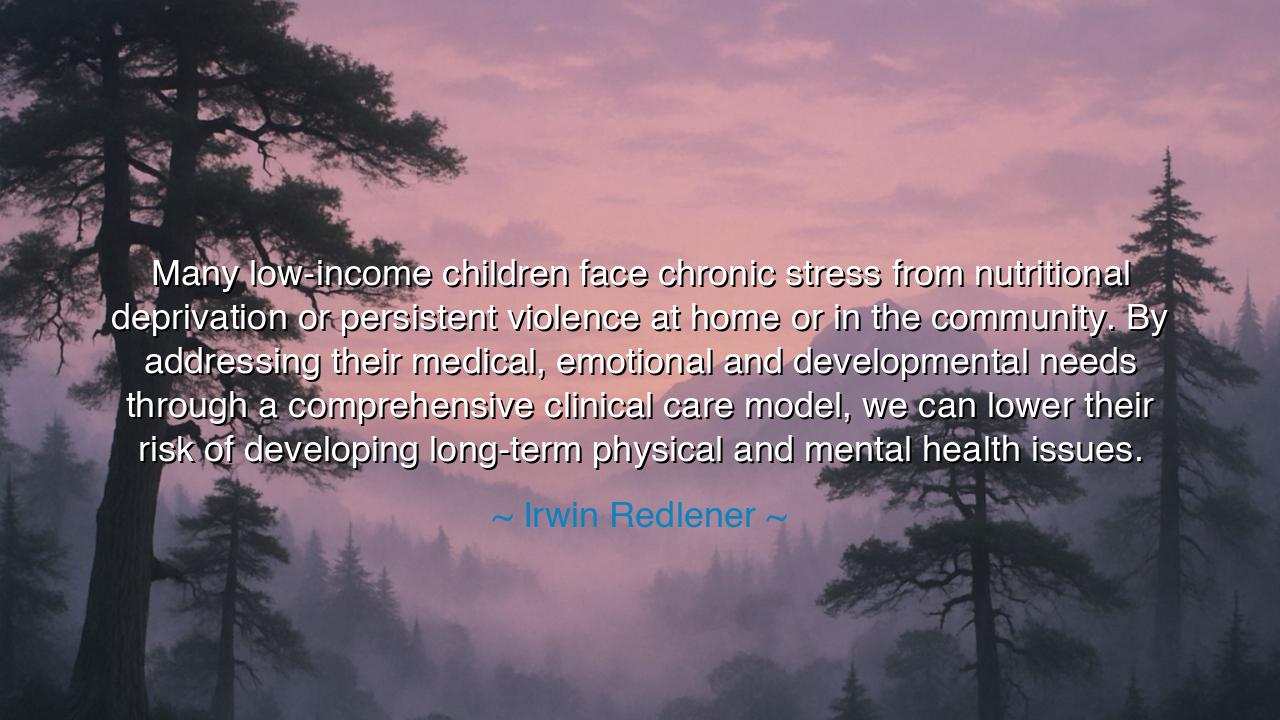
Many low-income children face chronic stress from nutritional
Many low-income children face chronic stress from nutritional deprivation or persistent violence at home or in the community. By addressing their medical, emotional and developmental needs through a comprehensive clinical care model, we can lower their risk of developing long-term physical and mental health issues.






The words of Irwin Redlener—“Many low-income children face chronic stress from nutritional deprivation or persistent violence at home or in the community. By addressing their medical, emotional and developmental needs through a comprehensive clinical care model, we can lower their risk of developing long-term physical and mental health issues.”—resound with the wisdom of one who has seen suffering with his own eyes and chosen to answer it with compassion and reason. They are not idle observations, but the cry of a healer who knows that to heal a child is to heal the future itself. For the child carries within them the seed of tomorrow, and if that seed is damaged by hunger, fear, or neglect, the harvest of a whole society will be barren.
From the dawn of time, the vulnerable have been the test of a civilization’s greatness. The prophets of old warned that a people would be judged by how they treated the orphan and the widow. The wise of Greece and Rome declared that the health of the young was the foundation of the state. Redlener’s words echo this ancient wisdom, but they clothe it in modern truth: that chronic stress, nutritional deprivation, and violence are not only wounds of the moment—they carve scars into body and mind that endure for decades, shaping destinies in silence.
Consider the story of the Children’s Health Fund, co-founded by Irwin Redlener himself. In the streets of New York, he saw children without homes, living in shelters, stripped of medical care. To answer this, he built mobile medical units—clinics on wheels—that brought care directly to them. These were not only doctors’ offices but sanctuaries, where children received medical, emotional, and developmental attention. In saving these children, he was not only treating illness but preventing the long shadow of disease and despair from reaching into adulthood. His vision shows that care must be comprehensive, for the child is not just a body, but a soul, a mind, a future.
His words reveal a profound truth: that healing must be proactive, not reactive. It is not enough to wait until sickness overwhelms or trauma festers into adulthood. The wise physician does not only fight the fire but builds walls to keep the flame from spreading. In this way, comprehensive clinical care is not charity, but strategy—an investment that prevents the birth of greater suffering later. When the needs of children are met early, their paths are strengthened, and entire societies are spared the burden of brokenness.
There is also courage in Redlener’s optimism. For the world often looks upon the poor child and shrugs, as though their suffering is inevitable. But he declares otherwise: that we can lower their risk, we can intervene, we can change the trajectory. His is the voice of defiance against despair. He speaks like a general who sees the battlefield not as lost, but as winnable, if only we muster the will to act.
The lesson for us is timeless: if we wish to build a just and healthy world, we must begin with the child. Let no child be unseen, unfed, untreated. For the child’s suffering is not confined to them—it spreads outward, shaping schools, families, cities, and nations. To invest in children is to invest in the very survival of civilization. And to neglect them is to invite ruin upon the generations.
Practical action is clear: support programs that deliver medical and emotional care to vulnerable children. Advocate for policies that provide food, shelter, and safety to every household. And in daily life, be attentive to the children around you—listen to them, protect them, and help meet their needs, even in small ways. For every act of care is a stone laid in the foundation of a stronger tomorrow.
So let Irwin Redlener’s words echo like a charge to all who hear them: the health of children is the health of the future. To feed them, to heal them, to protect them from violence and despair, is to honor life itself. Let us remember this truth, and let us act, so that when the children of today grow into the leaders of tomorrow, they will inherit not scars, but strength.






AAdministratorAdministrator
Welcome, honored guests. Please leave a comment, we will respond soon